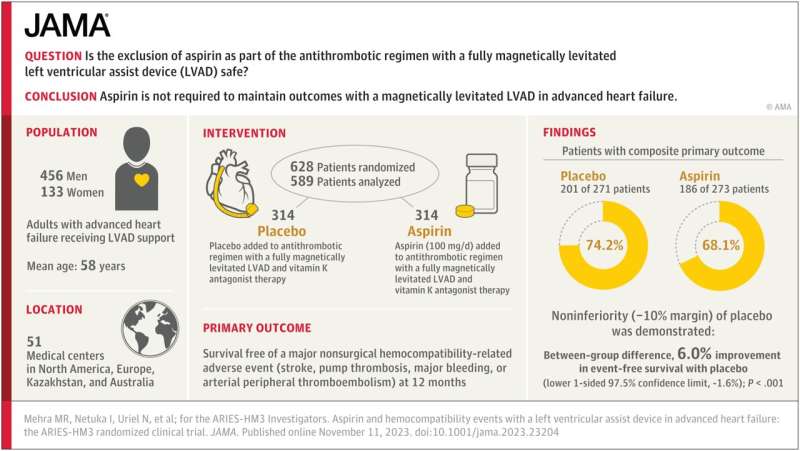November 14, 2023 report
This article has been reviewed according to Science X's editorial process and policies. Editors have highlighted the following attributes while ensuring the content's credibility:
fact-checked
peer-reviewed publication
trusted source
proofread
In clinical trial, aspirin avoidance leads to better outcomes for patients with left ventricular assist devices

A multi-institution research effort led by Harvard Medical School, Boston, has looked into the safety and efficacy of excluding aspirin from the treatment of patients with advanced heart failure receiving a fully magnetically levitated left ventricular assist device.
In a paper titled "Aspirin and Hemocompatibility Events With a Left Ventricular Assist Device in Advanced Heart Failure—The ARIES-HM3 Randomized Clinical Trial," published in JAMA, the team finds a decrease in bleeding events without an increased risk of thromboembolic events when aspirin is avoided.
The study included 628 patients with advanced heart failure and fully magnetically levitated left ventricular assist device (LVAD). Patients were randomized 1 to 1 to receive either aspirin (100 mg/d) or a placebo in addition to an anti-thrombotic regimen with vitamin K antagonist.
The primary endpoint was survival free of nonsurgical major hemocompatibility-related adverse events at 12 months. Aspirin avoidance resulted in slightly better outcomes than the aspirin-containing regimen, with a 6.0% improvement in event-free survival with placebo.
The study also looked for nonsurgical bleeding events and found aspirin avoidance associated with a significant reduction in nonsurgical bleeding events (relative risk, 0.66). No increases in thromboembolic events were observed.
The researchers estimated that for every 100 patients implanted with LVAD, aspirin avoidance prevented 14.5 major bleeding events in the first year, resulting in a 47% decrease in days spent in the hospital and a 41% reduction in the cost of care for bleeding events. These findings suggest that avoidance of aspirin provides meaningful improvement in clinical outcomes in patients with advanced heart failure who receive a study LVAD.
Left ventricular assist devices enhance the quality and duration of life in advanced heart failure. Nonsurgical bleeding events are a leading cause of death in LVAD patients. Aspirin as an antiplatelet agent is a mandated component of treatment along with vitamin K antagonists for LVADs despite a lack of conclusive evidence of aspirin efficacy and safety under this scenario.
In the current study, aspirin avoidance was associated with a meaningful improvement in clinical outcomes, including decreased hospitalization rates and lower bleeding complications, suggesting that mandated aspirin use may need to be removed from some LVAD treatment plans.
There may be benefits for some patients that could not be addressed by the current study, as patients for whom investigators initially deemed aspirin therapy as necessary were excluded from the study.
More information: Mandeep R. Mehra et al, Aspirin and Hemocompatibility Events With a Left Ventricular Assist Device in Advanced Heart Failure, JAMA (2023). DOI: 10.1001/jama.2023.23204
© 2023 Science X Network




















